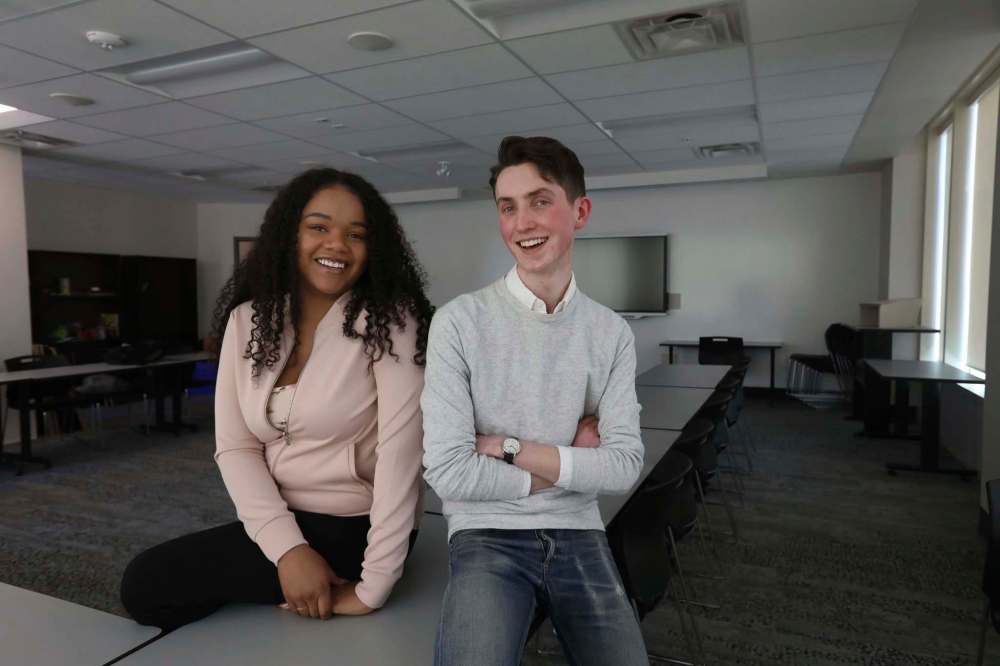Putting reconciliation into practice
'Urban Peace Corps' gives suburban students new perspective of North End life
Advertisement
Read this article for free:
or
Already have an account? Log in here »
To continue reading, please subscribe:
Monthly Digital Subscription
$1 per week for 24 weeks*
- Enjoy unlimited reading on winnipegfreepress.com
- Read the E-Edition, our digital replica newspaper
- Access News Break, our award-winning app
- Play interactive puzzles
*Billed as $4.00 plus GST every four weeks. After 24 weeks, price increases to the regular rate of $19.95 plus GST every four weeks. Offer available to new and qualified returning subscribers only. Cancel any time.
Monthly Digital Subscription
$4.99/week*
- Enjoy unlimited reading on winnipegfreepress.com
- Read the E-Edition, our digital replica newspaper
- Access News Break, our award-winning app
- Play interactive puzzles
*Billed as $19.95 plus GST every four weeks. Cancel any time.
To continue reading, please subscribe:
Add Free Press access to your Brandon Sun subscription for only an additional
$1 for the first 4 weeks*
*Your next subscription payment will increase by $1.00 and you will be charged $16.99 plus GST for four weeks. After four weeks, your payment will increase to $23.99 plus GST every four weeks.
Read unlimited articles for free today:
or
Already have an account? Log in here »
Hey there, time traveller!
This article was published 26/04/2018 (2820 days ago), so information in it may no longer be current.
University of Winnipeg political science student Riley Black won’t be suiting up in a jacket and tie next week for his summer job.
The Kelvin High School grad will be busing to the North End to work at the John Howard Society, an inmate rights advocacy agency, earning university credits toward an urban studies course and opening a window on how reconciliation works in Winnipeg.
The dress code for this job is jeans and T-shirts.

Black is one of 20 students selected for a joint initiative between U of W and the city, with the idea of putting the principles of the Truth and Reconciliation Commission into practice.
The students are a mix of immigrant, Indigenous and non-Indigenous suburbanites enrolled in degree programs.
One day a week the group is in class and the rest of the week they work job placements with various inner-city and North End community agencies.
“I’m hoping to gain a greater understanding of life in the inner city and North End,” said Black, who lives in River Heights.
“I think these neighbourhoods are often misrepresented and misunderstood. I want to create relationships with a variety of people.”
In fact, the 21-year-old fourth-year political science student said until this year, he had never had a meaningful conversation with an Indigenous person in his life.
“That makes it hard to get involved with the people we’re supposed to be reconciling with, when there’s no relationship. That’s the problem,” Black said Wednesday.
He finally had that conversation this spring, riding Winnipeg Transit to class at the U of W’s Merchants Corner in the North End.
In its simplest form, the program is a roving classroom with job placements run out of the urban and inner-city studies department. It pays $15 an hour and earns students six university credits toward graduation. Forty per cent of students are Indigenous, 10 per cent are immigrants and the rest are non-Indigenous.
Chelsea Bannatyne self-identifies as an Afro-Indigenous woman. At 21, she has a handle on what life is like for Indigenous Canadians and is in her second year of a human rights and urban and inner-city degree program.
“I hope to get some hands-on experience and learning by looking at how community organizations in the North End are working toward reconciliation,” she said.
This year Ka Ni Kanichihk, Welcome Place, John Howard Society, Peaceful Village and Graffiti Gallery are among the social-services agencies providing job placements for the class.
“We don’t know of another program like this in the country,” said associate professor Shauna MacKinnon, U of W’s chair of urban and inner-city studies. MacKinnon designed the program and runs it out of Merchants Corner, site of the former Merchants Hotel on Selkirk Avenue.
“It’s a two-year pilot program and we’re hoping to continue it,” she said. “We’re encouraging the city to continue to fund it and Brian Mayes has been the champion for it.”
Coun. Mayes (St. Vital) brought the concept to the university after seeing a similar model decades ago in Boston.
“It’s kind of like an urban Peace Corps,” he said Wednesday, describing how the concept first inspired him nearly 30 years ago.
Then-U.S. president John F. Kennedy set up the Peace Corps in the 1960s as a program for American college grads. As volunteers, they typically worked two-year stints overseas, on economic development and social projects in Third World countries.
In Canada, the Truth and Reconciliation Commission gave Mayes a platform to adapt a similar program for Winnipeg.
Once the university was on board, Mayes spearheaded funding through city council.
“I did go to the university with the idea and I did fight pretty hard for it in the budget, and we got $200,000 a year for it over two years. That’s $400,000,” the councillor said.
The funding ends after this summer; Mayes and MacKinnon both hope to tap into funding through the city and other sources to keep it going.
“We want to provide opportunities for Indigenous students, but for me, the ones who will learn the most from it are from more privileged backgrounds,” MacKinnon said.
“These students come to the program because they’re curious and they want to learn, but they have all sorts of misconceptions about the reality of (life in) the North End.
“What we do is we create a level playing field for them. What they learn is that the North End is about more than just crime and poverty.”
alexandra.paul@freepress.mb.ca

